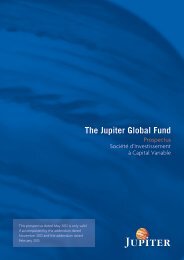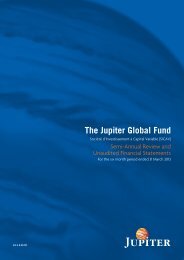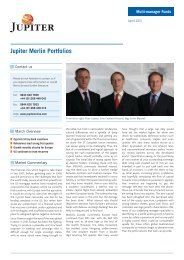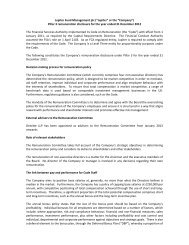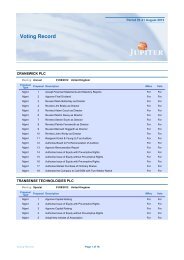The Jupiter Global Fund - Jupiter Asset Management
The Jupiter Global Fund - Jupiter Asset Management
The Jupiter Global Fund - Jupiter Asset Management
You also want an ePaper? Increase the reach of your titles
YUMPU automatically turns print PDFs into web optimized ePapers that Google loves.
the jupiter global fund<br />
<strong>Jupiter</strong> New Europe<br />
■■<strong>Jupiter</strong> New Europe Review of Portfolio as at 30 September 2012<br />
Performance<br />
NAV 30.09.12 30.09.11 % Change<br />
Class L US Dollar Shares USD 6.75 USD 5.96 13.26%<br />
Class L Euro Shares EUR 7.30 EUR 6.17 18.31%<br />
Class L Sterling Shares GBP 8.36 GBP 7.67 9.00%<br />
Market Review<br />
Regional markets were heavily influenced by external factors in the<br />
period under review, in particular by the eurozone crisis. While share<br />
prices have been pressured by weak sentiment, the largest economies<br />
in our region and the operational results of the companies in our portfolio<br />
have shown considerable resilience. <strong>The</strong> Russian economy has largely<br />
recovered from the recession of 2008-09 and recent statistics suggest<br />
that Russian consumers are in a good position. Unemployment is at its<br />
lowest level since 1999, while real wage growth is allowing for increasing<br />
levels of spending, helping to drive real annual retail sales growth.<br />
However, Russian equities have not performed as strongly as might<br />
have been expected during the year to 30th September 2012.In Turkey,<br />
the government has enjoyed some success in rebalancing the economy<br />
and preventing it from overheating following an 8.5% surge in GDP in<br />
2011. Growth moderated to3.2% year on year in the first quarter of<br />
2012, while the current account deficit narrowed to 8.6% of GDP in May,<br />
down from10% at the end of 2011.<br />
Policy Review<br />
For the year to 30 September 2012, the <strong>Fund</strong> has returned 18.3%<br />
compared to 23.8% for its benchmark the MSCI Emerging Markets<br />
Europe 10/40 index. <strong>The</strong> underweight position in central Europe has<br />
weighed on performance, particularly in the last nine months or so, as<br />
central bank measures to increase liquidity coupled with tentative signs<br />
of progress in resolving the eurozone crisis caused these markets to<br />
rally in spite of weakening fundamentals. <strong>The</strong> main stock-specific factor<br />
working against performance has been the <strong>Fund</strong>’s position (3.6% as at<br />
30 September 2011) in Russia vodka producer Synergy (-21% in GBP<br />
in the 12 months to 30 September 2012), which suffered from<br />
unfavourable regulatory developments, including a sharp increase in<br />
excise duty, causing results to disappoint. <strong>The</strong> <strong>Fund</strong> has an overweight<br />
stance in Russia and Turkey. In Russia, key positions include consumerfocused<br />
stocks such as food retailer Okey, and infrastructure plays such<br />
as Russia’s largest transport construction company Mostotrest. In<br />
Turkey, we hold significant positions in banks, which provide exposure<br />
to the underleveraged consumer and underpenetrated mortgage<br />
market. <strong>The</strong> <strong>Fund</strong> has almost no positions in central Europe (other than<br />
a small holding in Polish insurer PZU) as these economies have<br />
suffered a sharp slowdown in recent months due to their greater<br />
exposure to the crisis in the Eurozone.<br />
Investment Outlook<br />
<strong>The</strong> success of Turkish policymakers in reducing macroeconomic<br />
volatility has allowed investors to increase their focus on the country’s<br />
long-term growth drivers: favourable demographics, rising productivity<br />
and improved governance. Following a recent research trip, we have<br />
increased the <strong>Fund</strong>’s Turkish exposure by around 10% on the view that<br />
corporate earnings are set to surprise positively, creating scope for the<br />
market to continue performing strongly. We believe that Turkey currently<br />
offers better opportunities than central European markets to which we<br />
currently have no exposure on the view that those countries will be<br />
badly affected by the slowdown in the eurozone.<br />
After 18 years of negotiations, Russia finally joined the World Trade<br />
Organisation this summer. While the gains from membership are mostly<br />
of a long-term nature, it is an important signal of the government’s<br />
commitment to liberalise the economy. Russian equities look<br />
increasingly attractive from a dividend perspective following<br />
encouragement from the government to increase payout ratios. As a<br />
result, the dividend yield for the Russian market – which historically was<br />
lower than in other markets – has now caught up with emerging market<br />
peers and stands at around 3.2%. Long term structural growth drivers,<br />
macroeconomic strength and low valuations combine to create<br />
compelling investment opportunities in Russia and Turkey.<br />
Elena Shaftan, Ingrid Kukuljan and Colin Croft<br />
30 October 2012<br />
58



